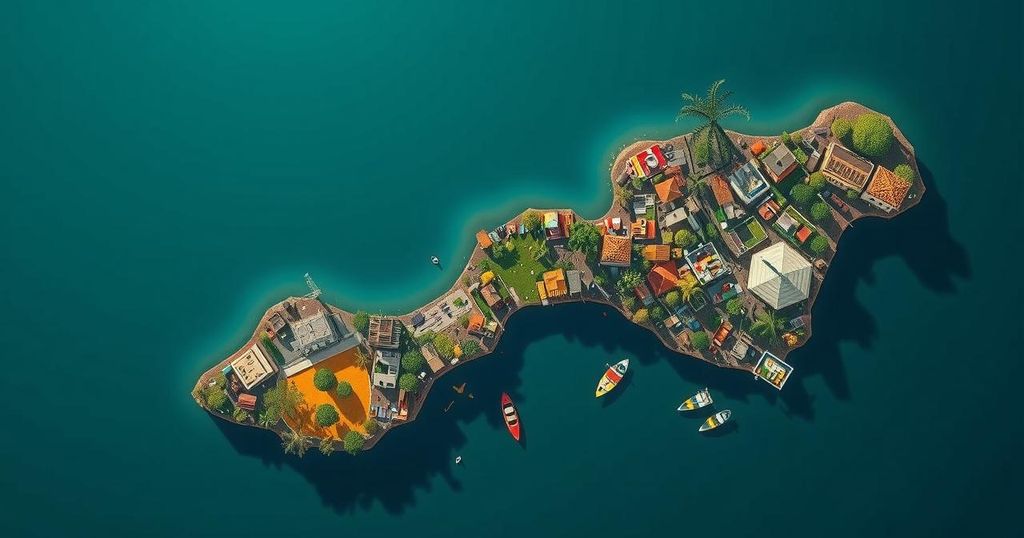Sardinia, represented by President Alessandra Todde, is leading an assertive movement for climate action and local governance in energy planning, opposing excessive private energy projects and Italian government mandates. Thousands have rallied for the ‘Pratobello 24’ initiative, advocating for local control over energy installations while safeguarding the island’s cultural heritage. The evolving situation underscores the importance of regional autonomy in climate policy amidst ongoing protests and a push for sustainable community-led solutions.
In Gavoi, Sardinia, advancements in energy production and carbon emissions reduction are publicly showcased as the island develops its path towards significant climate action. As global climate advocates gather for the COP29 conference in Azerbaijan, Sardinian President Alessandra Todde emphasizes an urgent collective response to the climate emergency following recent disasters. Despite being an autonomous region of Italy, Sardinia diverges from the central Italian government’s plans, seeking autonomy in renewable energy development amidst growing concerns over private energy projects.
Thousands rallied for the “Pratobello 24” initiative, delivering over 210,000 signatures to the regional government, advocating for local control over urban planning and renewable energy regulations. President Todde asserted, “Sardinia, like it or not, will not accept to passively suffer decisions made from above,” highlighting the island’s determination in the struggle against perceived top-down climate policies.
Sardinia’s Regional Council has enacted an 18-month suspension of extensive wind and solar energy projects launched under previous government plans, asserting local interests in an energy landscape dominated by external corporate interests. This move faced swift backlash from Rome, where Prime Minister Giorgia Meloni announced intentions to challenge the regional autonomy legally.
As Sardinia continues to redefine its energy transition goals, it aims to protect its cultural and natural landscapes while pursuing renewable energy. Amidst a growing cultural reawakening, various local groups are advocating for environmental and cultural protection, fostering unity against alienating energy projects.
Activists are particularly concerned about the impact on the island’s rich archaeological heritage, voicing fears that solar and wind projects could undermine Sardinia’s historical significance. Leaders like former mayor Angela Corrias and local mayors have publicly denounced projects threatening historical sites, reinforcing the island’s commitment to preserving both its natural and cultural integrity.
As Sardinia asserts its identity and rights, residents view the crisis as an opportunity to reclaim their cultural narrative and craft a sustainable future, diverging from a reliance on fossil fuels. Initiatives such as the MusaMadre Project signal a commitment to eco-cultural alliances as the island strives for energy independence.
The continuing efforts highlight how Sardinia, through its struggles, emphasizes the importance of local governance in climate action, serving as a legislative model for other regions. The legal battle over energy jurisdiction exemplifies the island’s determination to chart its path while engaging its citizens meaningfully. The outcome of this conflict could potentially establish Sardinia as a vital player in the Mediterranean’s renewable energy landscape.
Sardinia, an autonomous region of Italy, is actively challenging the Italian government’s energy policies as part of a broader response to climate change. Following devastating climate-related events, Sardinian leadership seeks to address the climate emergency through grassroots action and collective governance. This entails reclaiming control over urban and energy planning to resist excessive private sector influence and to catalyze regional sustainability efforts while prioritizing local values and heritage in the face of ongoing industrial pressure. The island views these initiatives as an opportunity not only to advance renewable energy but also to protect its cultural and historical sites from the invasive nature of unchecked industrial development.
Sardinia’s ongoing struggle for climate autonomy illustrates the critical importance of local governance in combating climate change. The island’s assertive stance against the central government’s energy projects reflects a growing global sentiment advocating for community-led climate solutions that prioritize environmental integrity and cultural heritage. As Sardinia navigates its legal and political challenges, the outcome will likely influence the broader debate over renewable energy governance in Europe, showcasing the potential of localized activism in shaping sustainable futures.
Original Source: www.salon.com






